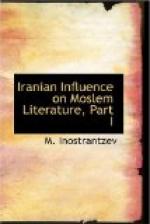[The cultivator along with the harvest gets grass and vegetation which may serve as a pasture for cattle.]
[Sidenote: Burzoe starts practice.]
I, therefore, directed my attention to the hope of securing recompense in the next world by curing the sick and was at considerable pains in the treatment of all the deceased whom I hoped to cure and even such as were past all such hopes, whose suffering I endeavoured at least to alleviate. I personally attended those I could; but where this was not possible I gave the patients the necessary instructions and also sent medicine. And from none of those whom I so treated did I demand payment or other return. I was jealous of none of my colleagues who was my equal in knowledge and who excelled me in repute and riches; although as a matter of fact he was lacking in equity and good manners. When, however, my soul felt inclined to impel me to be jealous of such and to be covetous of a situation like his I met it with severity in the following manner:—
[Sidenote: Burzoe addresses his own soul. The physician’s arduous calling.]
[Sidenote: A simile.]
O soul, dost not thou differentiate between what is useful and what is injurious to thee? Dost thou not cease wishing for the acquisition of that which secures for every one a small gain but which entails severe exertion and privation and which, when he must at last relinquish it, procures him much sorrow and severe punishment in the next world? O soul, thinkest thou not of that which succeeds this life and forgettest it because of thy avarice for the things of this world? Art thou not ashamed to live the evanescent terrestrial life in the company of men of feeble intellect and fools? It belongs not to him even who has something of it in his hand: it does not endure with him and only the infatuated and the negligent depend upon it. Desist from this irrationality and bend all thy might, so long as in thee lies, to exert thyself for the good and for divine recompense. Beware of procrastination. Reflect on the fact that our body is destined to all manner of unhappiness and permeated with the four perishable and impure principles which are enclosed in it, which struggle against each other, defeating each other by turn, and thus support life which itself




